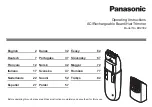
GUIDELINES FOR USING EXTENSION CORDS
USE THE PROPER EXTENSION CORD. Make sure your extension cord is in good condition.
When using an extension cord, be sure to use one heavy enough to carry the current your product
will draw. An undersized cord will cause overheating. The table below shows the correct size to use
depending on cord length and nameplate ampere rating. If in doubt, use the next heavier gauge.
The smaller the gauge number, the heavier the cord.
Minimum Gauge for Extension Cords (AWG)
(when using 120 V only)
Ampere Rating
More Than
0
6
10
12
Not More Than
6
10
12
16
25’ (7.6 m)
18
18
16
14
50’ (15 m)
16
16
16
12
100’ (30.4 m)
16
14
14
Not Recommended
150’ (45.7 m)
14
12
12
Total Length of Cord in Feet (meters)
WARNING
ALTHOUGH THIS GRASS TRIMMER IS DOUBLE INSULATED, THE EXTENSION CORD AND
RECEPTACLE MUST STILL BE GROUNDED WHILE IN USE TO PROTECT THE OPERATOR
FROM ELECTRIC SHOCK.
ELECTRICAL INFORMATION
Make sure your extension cord is properly wired and in good electrical condition. Always replace a
damaged extension cord or have it repaired by a qualified person before use. Keep extension cords
away from sharp objects, excessive heat and damp or wet areas.
Use a separate electrical circuit for your tools. This circuit should comprise a wire of at least 12
gauge and should be protected with a 15 A time-delayed fuse. Before connecting the motor to the
power line, make sure the switch is in the OFF position and the electric current is identical to that
stamped on the motor nameplate. Running at a lower voltage will damage the motor.
8






































